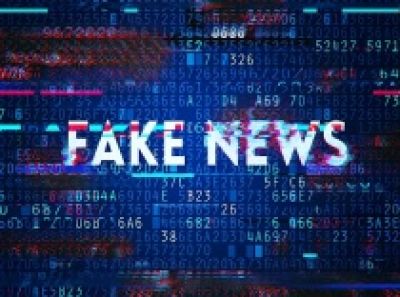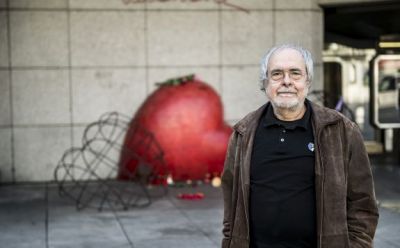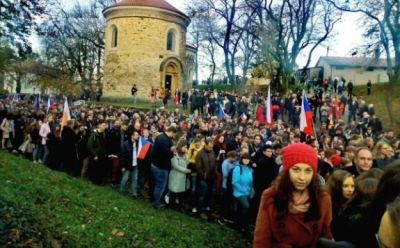Belarusian opposition leader Sviatlana Tsikhanouskaya, who ran in the 2020 presidential election against strong-arm leader Alexander Lukashenko, is on a four-day visit to the Czech Republic. The leader was invited to Prague by the speaker of the Senate, Miloš Vystrčil. At a press conference on Monday morning, he referred to her as the president-elect and discussed Czech support for the democracy movement in Belarus.

Belarusian opposition leader Sviatlana Tsikhanouskaya and Rector Tomáš Zima during her visit to Charles University. Monday, June 7, 2021.
Tsikhanouskaya was herself forced into exile, finding asylum in Lithuania, from where she continues to push for free and fair elections in her home country. Most recently, the country’s leader Alexander Lukashenko sparked widespread condemnation with the forced landing of a commercial plane on a false pretense to allow the regime to arrest prominent young dissident Roman Protasevich.
On Monday, she and her team were also hosted by Charles University’s Rector Tomáš Zima and other school representatives: they discussed additional help for Belarusian students and how to promote democracy and change in Belarus.
Forum spoke to the opposition leader, asking first how she saw conditions in Belarus almost a year since the election ended (with Mr Lukashenko holding on to power) especially after recent events. Sviatlana Tsikhanouskaya:
The regime is escalating violence. Despite the violence, despite all of the victims who are in jail, people are [not giving up]. People are frightened and it is impossible to live in Belarus if you are fighting against the regime, but they are continuing. The movement has gone underground and they are looking for new ways to fight: it can mean leaving coded symbols in different parts of the city, reminding others “we are still here”. To remind them that they can put them in jails and torture them, but they are continuing.
Many people were forced to flee the country, but joined up in neighbouring or [nearby countries] like Poland, Lithuania, the Czech Republic. The diaspora is strong and very vocal. They are trying to keep Belarus on the agenda. Our main aim since the very beginning is for new and free elections to be held and nothing has changed. This is the moment when we are putting pressure on the regime so that they understand that there is no other way out. We will fight, the international community is [responding], there is no way out except negotiations and dialogue to end the political crisis.
We don’t want our country to fall into the deepest economic and tyrannical hole. We are also trying to help civic society, which needs resources to help people. And we are fighting for justice. There is no law in our country now and that is why it is necessary to look for justice abroad.
The world saw the Lukashenko regime respond with impunity, most recently the forced rerouting of a commercial airliner over Belarusian airspace in what was effectively a state-sanctioned hijacking. The forced landing led to the arrest of the journalist Roman Protasevich and his girlfriend and, in a subsequent interview, he was forced to answer questions under extreme duress. What does it say to you that the regime is willing to go to such lengths?
We see a regime that cannot think strategically anymore. What we saw was an emotional step by Lukashenko. He saw a personal enemy in Roman and wanted revenge and wanted to show the whole world. For sure, we knew Roman would be tortured, that he would describe details of his team and the revolution. What the regime doesn’t understand that no one believes it anymore. Even if they were suddenly to tell the truth, no one would believe them. They torture people into confessions, frighten others by threatening families so that people will say what the regime wants. We have no right to judge Roman or people in that situation. What we need to focus on is their release.
How encouraged were you by the international response and what more do you expect from the European Union or the United States?
First, action needs to be taken jointly: the US, EU, Great Britain, Ukraine. When actions are taken jointly they are much stronger. One of the most powerful levers against the regime are economic sanctions. We saw it in the past, nine years ago when only the threat of sanctions led to the release of political prisoners. Lukashenko doesn’t understand any other language than the language of power. In 2011, there were about 40 political prisoners and 200 people were on the EU’s sanction list. Today, there are around 500 political prisoners and only 80 people on the sanctions list. That’s nothing. The EU has to answer the hijacking with very strong sanctions. Targeted economic sanctions affecting Lukashenko’s pockets, as well as private sanctions affecting everyone from prosecutors to judges who were involved in past wrongs including the falsification of the election results. We think this is the most powerful form of leverage, together with political isolation. We would like the European Union to provide help with civic society. We understand there are a lot of things going on in the world and it’s easy to forget Belarus but we are here in front of your nose, we are your neighbours and we are suffering.
Today you met with representatives of Charles University here on university grounds: what role should universities play? A conference about life in Belarus and the problems the country faces, was one proposal discussed, possibly with a broader outreach within the 4EU+ Alliance. In Belarus, some students were persecuted, and thrown out of schools, and people should know about that.
Universities play a huge role in spreading information and student are our motivators. They are the next generation and will determine policy in the future. Universities can help by launching programmes helping students who had to flee the country or who were expelled. To launch online programmes, as well as to be more vocal, holding lectures on conditions in Belarus, to ask students to investigate, to write papers, or event to write to political prisoners as an expression of solidarity.
At the level of the government, I will be meeting with the prime minister as well as the president. We have a lot of gratitude towards the Czech Republic for how the country has helped and ask only for the country to be more vocal and to support fourth and fifth sanction lists and so on. The country has been a real example of how a country can act in a difficult situation.

Sviatlana Tsikhanouskaya with Charles University's Tomáš Zima.
During her visit, Sviatlana Tsikhanouskaya will meet the country’s prime minister, president and other representatives and has been invited to speak in the upper chamber of Parliament about developments in Belarus.






















